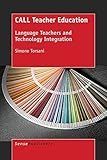CALL teacher education : language teachers and technology integration / Simone Torsani.
Material type: TextPublisher: Rotterdam : Sense Publishers, [2016]Copyright date: �2016Description: 1 online resource (xviii, 214 pages) : illustrationsContent type:
TextPublisher: Rotterdam : Sense Publishers, [2016]Copyright date: �2016Description: 1 online resource (xviii, 214 pages) : illustrationsContent type: - text
- computer
- online resource
- 9789463004770
- 9463004777
- Language and languages -- Computer-assisted instruction -- Study and teaching
- FOREIGN LANGUAGE STUDY -- Multi-Language Phrasebooks
- LANGUAGE ARTS & DISCIPLINES -- Alphabets & Writing Systems
- LANGUAGE ARTS & DISCIPLINES -- Grammar & Punctuation
- LANGUAGE ARTS & DISCIPLINES -- Linguistics -- General
- LANGUAGE ARTS & DISCIPLINES -- Readers
- LANGUAGE ARTS & DISCIPLINES -- Spelling
- 418.00285 23
- P53.28 .T668 2016eb
Includes bibliographical references (pages 199-209) and index.
Print version record.
Foreword -- Acknowledgements -- Introduction: The Function of CALL Teacher Education -- CALL and CALL Education in the Words of Researchers -- Computer Assisted Language Learning as a Study Branch -- Definition of Computer Assisted Language Learning -- Historical Development of CALL -- CALL Today -- Related Disciplines and Components -- Research Themes -- Roles -- Conclusions: A Wide Perspective -- Technology and Language Education -- Introduction: An In Depth Analysis -- Technology and Language Teaching: A Theoretical Perspective -- Linguistic Frameworks for CALL -- CALL Options for Language Education -- Conclusions: Approaches in the Relationship between Linguistics and Technology -- The Integration of Technology into Language Education -- Introduction: Integration, a Bird's Eye View -- Integration -- A Socio-Cultural Perspective on Integration -- Normalisation -- Integration and CALL Teacher Education -- Transfer and Integration -- Integration and Reconstruction -- Integration: A Sum-up -- Foundations of CALL Teacher Education -- CALL Teacher Education as an Area of CALL -- CTE: An Overview -- Diffusion of CALL Teacher Education -- CTE and Second Language Teacher Education -- A Model for CTE -- Trends in CTE -- CTE Research -- CTE from Theory to Practice -- Introduction: Integration as the Goal of CTE -- Models of CALL Competences -- Frameworks for CTE -- CALL Competences in Standards and Guidelines -- Conclusion -- Approaches and Processes in CTE -- Introduction: Approaches and Processes -- The Development of Digital Skills -- Approaches -- Processes I: Lesson and Demonstration -- Processes II: Project-Based Learning -- Processes III: Situated Learning -- Processes IV: Reflective Learning -- CTE and SLTE Practice -- Alternative Strategies to Formal Learning -- Conclusion: CALL Teacher Education and the Development of Professional Competences -- CALL Teacher Education for the Internet -- Introduction: The Internet within the Domain of CALL -- The Domains of Networked CALL -- Models for Online Language Teaching -- Processes in Teacher Education for the Internet -- Social Networks and Mobile Technologies -- Conclusions -- Procedures -- Introduction: CALL Training Activities -- Linguistic Area -- Procedural Area -- Technical Area -- Conclusions: The Linguistics/Procedure/Technique Model Revisited -- The CALL Course -- Introduction: A Theory of CALL Curriculum -- The CALL Curriculum -- Scenarios of CALL Courses -- Conclusions: One Course, Many Courses -- Conclusions: The Future of CALL Teacher Education -- Appendix A: List of Skills for Using a Virtual Learning Environment (Moodle) -- Appendix B: Six Criteria for CALL Tasks Evaluation -- Appendix C: CALL Applications -- References -- Index.
Book is a practical resource for teacher trainers who are about to deal with the challenging and exciting task of preparing language teachers to integrate technology into their everyday professional practice. As research yields results that show the solid and growing potential of technology for language education, Computer Assisted Language Learning has become a rather common subject in teacher training programmes worldwide. Based on the author's experience in teacher education, the present book aims at providing trainers with thorough methodological foundations and practical understanding to design and implement effective CALL courses. To achieve this goal, the volume collects and harmonises the different sources that constitute the base-knowledge of CALL Teacher Education and gradually leads the reader from theory down to practice. The volume, the first monograph on this subject, offers a comprehensive overview of CALL Teacher Education, both as an academic discipline and as a practice ambit, and explores among others the following topics: • The relationship between technology and language learning; • The integration of technology into language education; • Theoretical foundations of CALL teacher training; • Frameworks and standards for CALL education; • Approaches and processes; • CALL training procedures; • Curriculum design.
eBooks on EBSCOhost EBSCO eBook Subscription Academic Collection - Worldwide

